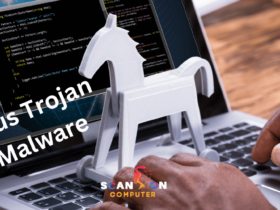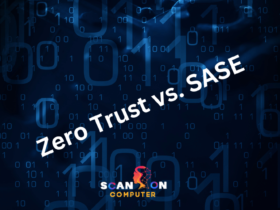Endpoint Security VPNs are essential tools in helping remote workers access network assets safely. Take a look at this infographic to gain more insight into how Endpoint Security VPNs can protect your organization.
As remote work becomes an increasing part of corporate culture, companies should pay equal attention to their security posture. NordLayer offers various solutions designed to safeguard data and enable remote employees accessing business-critical internal applications without risking cybersecurity breaches.
What Is a VPN?
VPNs (virtual private networks) use encryption technology to encrypt information sent between a device and remote servers, providing users with secure communications over public networks like the Internet. Many VPNs also employ advanced protocols for additional protections like spoofing the IP address of user devices – this helps prevent threats that rely on knowing where users’ locations lie such as doxing (publishing private information online) or DDoS attacks from taking effect.
VPNs can also help prevent data breaches by making it harder for attackers to steal login credentials like a username and password. Furthermore, these VPNs spoof your IP address, helping to bypass any content blocks or firewalls based on device location.
Since VPNs are such an essential security measure, IT teams should deploy them through an endpoint security platform in order to incorporate monitoring and proactive features. Such platforms can verify that desktop antivirus software is active on systems before granting remote access and that no keyloggers or malicious processes are running prior to granting remote access to any network.
What is Endpoint Security VPN?
Endpoint security is a cybersecurity practice designed to safeguard end-user devices such as phones, tablets and servers from cyberattacks. It involves inspecting files, processes and systems on each device for any malicious activity in order to detect potential issues on them.
Tradition antivirus software relying on regular signature updates can only keep up with so much; should a new virus enter a corporate network before its signature has been updated, this may allow it to spread unimpeded throughout.
An Endpoint Security VPN can check desktop antivirus and firewall software is up-to-date, systems are patched, keyloggers are disabled and sensitive data hasn’t been left behind in web caches or other vulnerable locations before granting remote-access. Furthermore, memory analysis reveals fileless malware infections.
Many of these tools offer centralized management capabilities for system administrators to effectively administer security for all endpoints via one interface. NordLayer can support your Zero Trust Network security with an array of hardware-independent tools that protect all your endpoints – from application control and data encryption to network access control and more.
How Do VPNs Affect Endpoint Security?
Endpoint security refers to the practice of safeguarding devices like laptops, phones and tablets from cyber threats and attacks. It may involve access security tools like two-factor authentication and device management software.
As businesses embrace BYOD policies and remote work arrangements, each device connected to corporate networks presents hackers with an entryway into company data. Employees frequently access workplace networks via home or public Wi-Fi connections that do not employ basic cybersecurity controls – exposing organizations to data breaches and compliance violations.
To avoid such risks, an effective endpoint solution must include security measures like VPNs, centralized management and enhanced authentication. By deploying your VPN through an endpoint security platform, you can manage it along with other device and network security functions from one dashboard, increasing visibility and decreasing misconfiguration risk. In addition, these platforms use advanced features like Data Loss Prevention (DLP) to scan files for malware before entering or leaving networks thereby limiting potential breaches’ damage potential.
VPN Vulnerabilities
Even though VPNs add another layer of protection, hackers still may find ways to break through.
As such, it’s vital that you remain current on endpoint security tools and best practices in order to keep your network secure against cyberattacks. These measures include cloud protection, endpoint security software, hardware/device protection and granular application control.
Researchers recently identified two vulnerabilities affecting VPNs that allow attackers to gain entry to victims’ routing tables, giving them access to read traffic that would normally pass over a secure tunnel – opening up opportunities for traffic interception, user deanonymization, webpage manipulation for malware distribution purposes, redirection to phishing sites and more.
The second vulnerability allows hackers to steal the IP address and location of victims by taking advantage of how VPN encrypts data to prevent intercept by malicious actors, but not all vendors correctly implement this feature. When attackers become aware of this flaw, they can create malware which bypasses anti-virus programs and traditional endpoint security tools by altering encrypted files so that it no longer looks legitimate.
Deploying VPN through Endpoint Security
Endpoint security is a cyber security practice that involves safeguarding any point of connection to a network, from desktop computers and laptops to servers, industrial control systems (ICS), medical devices and point-of-sale (PoS) hardware.
Effective endpoint security solutions offer multiple layers of defense for a company’s devices, networks and databases. They guard against external cybersecurity threats by monitoring files that enter the network; scanning for and blocking malware; protecting against zero-day vulnerabilities; and restricting employee access to sensitive data.
Centralizing security measures allows IT teams to more easily manage them from a central dashboard, saving both time and reducing the chance that a VPN configuration goes amis. NordLayer offers various Zero Trust Network solutions such as Endpoint Security VPN that can help your company protect itself against external vulnerabilities – get more details by reaching out now.
1. Data loss prevention DLP
Employees working remotely have become the weakest link in a business’ security infrastructure, leaving devices and internet connections as the weakest point. From personal phones or laptops, home Wi-Fi networks or public internet, these endpoints are vulnerable to cyber attacks from hackers who could steal data.
To safeguard against such threats, companies must employ an effective data loss prevention process, also known as DLP. This solution monitors data for changes that might indicate data breach such as large folder migrations, unusual login patterns and malware activity. DLP assists IT teams in detecting and stopping threats such as malware, macros, phishing scams and hacking attempts as they occur.
By deploying VPN through an endpoint security solution, you can strengthen the data loss prevention capabilities of your system and prevent sensitive information from leaving it, even when sent out or stored on devices. A strong DLP can also facilitate granular privilege management so users only receive those resources needed for their job duties.
2. Simplified management
With the increasing prevalence of BYOD and remote work, endpoint security is increasingly crucial to protect business data against malware attacks. An endpoint protection platform typically comprises antivirus functionality, next-generation firewalls (NGFW), virtual private networks (VPN) and application control to meet this challenge.
An endpoint security system’s tools can quickly identify new threats as they emerge by comparing files against an ever-growing cloud database of threat information, helping companies ensure all devices connected to their networks are up-to-date, free from malware, with permissions and access appropriately restricted.
NordLayer makes it easier to implement an endpoint security system by offering a VPN solution which encrypts all data transfers and communication tunnels when employees use their browsers, helping reduce threats of Wi-Fi breaches while safeguarding sensitive company data from being exposed externally via web browsers or public internet sites. In addition, NordLayer’s multi-cloud and hardware-independent tools ease management burden for IT teams; its centralized platform also enables administrators to verify device compliance as well as monitor users, devices, security state changes, as well as track users, devices, security state changes as well as access activity on devices connected by them.
3. Authentication
Authentication is another key advantage of VPNs deployed with an Endpoint Security platform, giving IT teams control over all devices connecting to their networks, ensuring they are up-to-date, have installed any necessary security tooling and have permissions that have been appropriately restricted. This helps reduce risks related to staff logging on through public Internet websites where attackers could gain entry using stolen credentials and passwords.
As such, hackers’ ability to develop malware as it evolves is limited due to security controls like NGAV scanning and authentication that ensure files sent across a network match against an ever-growing threat information database. Furthermore, it helps limit damage caused by malware that encrypts files before sending it off to remote servers; companies can utilize this feature to ensure data protection even when employees work remotely or in less than secure environments.
4. Incident response
Cyberattacks can cost businesses millions in ransomware payments, operational disruption costs, lost IP assets and revenue losses. Cyber attacks also increase insurance premiums and may incur regulatory fines; endpoint security systems can save companies millions by detecting and blocking breaches before they cause irreparable damage.
Anti-malware software can detect and quarantine malware on an endpoint device before it spreads to other connected devices on a network. Furthermore, centralized systems can monitor all network activity and enforce corporate policies to reduce the risk of breaches.
As signature-based antivirus/antimalware solutions can miss up to 60% of attacks due to vendor discovery timeframes and virus definition updates, it may be beneficial for companies to set one-time exemptions that allow certain users (such as sales reps who need to give presentations) to bypass an endpoint check in order to safeguard company data while preventing leakage of sensitive information. This helps the business protect sensitive data.
is it worth having VPN Endpoint Security?
BYOD in the workplace has exposed your network to many external cybersecurity risks. Even if your business already employs numerous protection tools, hackers are constantly evolving their attacks against businesses – adding endpoint security is one way to ensure you remain aware of and vigilant against the latest risks.
Endpoint security solutions typically consist of antivirus software for both computers and mobile devices, firewall protections, email gateways to block phishing attacks, data control capabilities to encrypt sensitive information securely while preventing unapproved access, email gateways to block spam emails from malicious sources, email gateways that filter spam email as well as data control capabilities that encrypt and prevent unauthorized access, email gateways for blocking spam phishing attempts and data control features that encrypt sensitive files to protect them against unauthorized use and more.
Some endpoint security solutions employ machine learning and AI to detect sophisticated attacks that evade signature detection systems – this process is known as endpoint detection and response (EDR). They may also use memory analysis to detect fileless malware or zero-day attacks; and synchronize web filtering policies across FortiGate for consistent enforcement, so they can act swiftly against suspicious activities on the network.
Protect Your Remote Workforce With an Endpoint Security VPN
Securing remote work can be an immense challenge for businesses, given the proliferation of devices used by employees to access company systems from personal computers or phones. Employees could potentially face many risks from unsecure access via these methods.
One such breach is Wi-Fi breaches, where hackers gain entry to home routers or other vulnerable connections and steal sensitive information. Luckily, there are solutions to protect from these attacks.
Final Thoughts
No matter if it be VPNs, network protection systems or hardware and software products, endpoint security tools do not come without vulnerabilities; however, they can significantly lower risk by protecting against commonly exploited attack vectors.
These can include malware, ransomware and spyware which steal data, disrupt business processes or cause lasting harm to a company’s reputation. A good EPP solution should detect any changes made by malware to your system and rollback any changes back, returning your system back to its pre-infection state.
Companies can bolster their defenses by instituting password policies requiring users to utilize long, complex passwords that they change regularly and encrypting devices to protect data even if transferred or stolen – these measures eliminate many gaps found in traditional IT security solutions while alerting and logging features provide IT teams with quick response times for threats identified or potentially identified by them.











Leave a Reply
View Comments